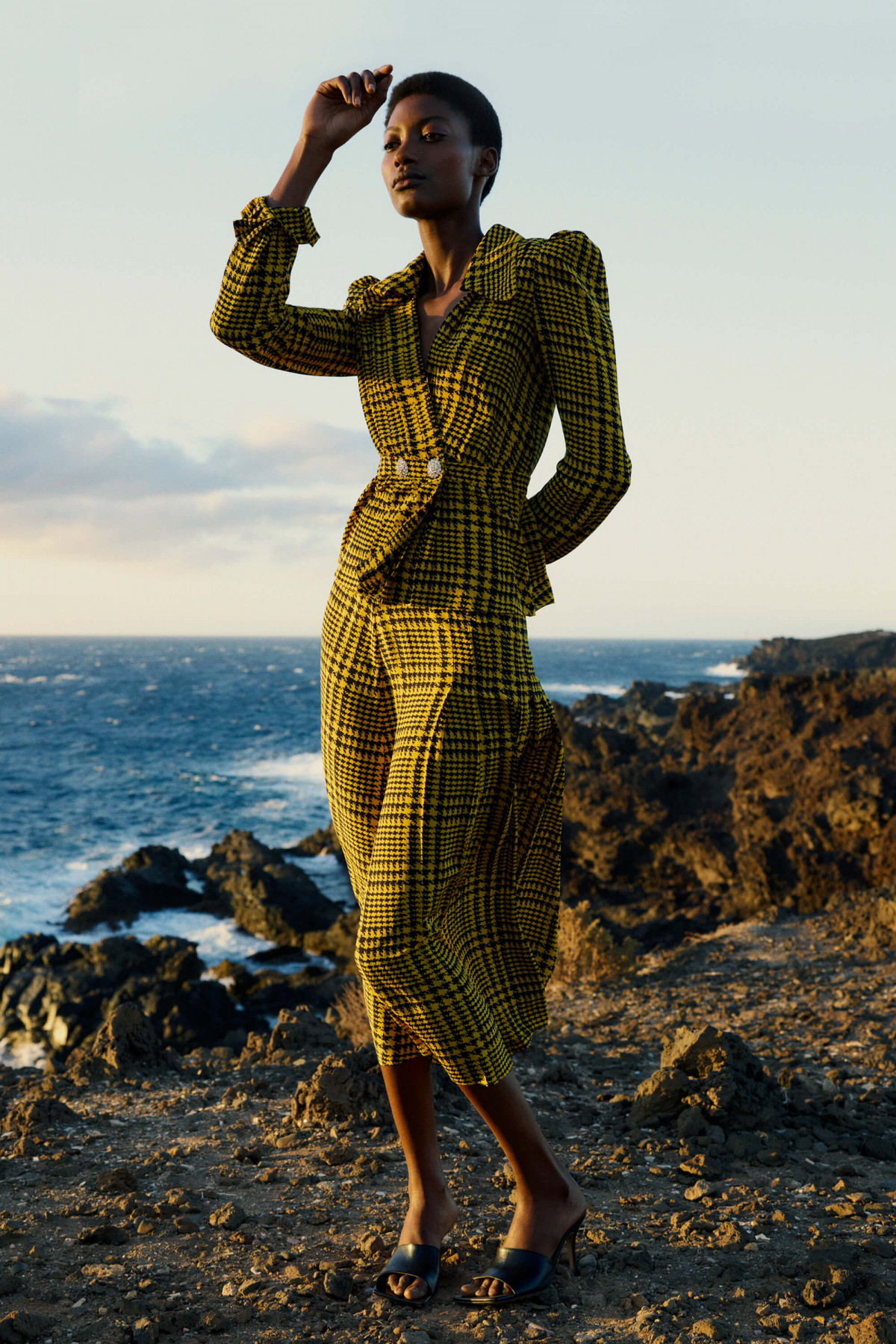As Black Lives Matter protests spread across America in June, Brother Vellies founder Aurora James saw her inbox flooded with messages of solidarity from friends in the industry, but their words rang hollow. “I was reading that they supported me, but I wasn’t necessarily feeling it,” she says. “What would it take to feel like these people really stood with me?”
Her answer was the 15 Percent Pledge, a new nonprofit calling on retailers to match their representation of Black business owners to the Black population of America. As brands and retailers grapple with the racial inequality within their ranks, the pledge offers a more tangible solution than committees, unconscious bias training and improved outreach in recruitment.
The Canadian designer has some experience financially empowering Black communities, having founded Brother Vellies in New York in 2013 with the aim of supporting African craft and creating jobs across the continent. The luxury accessories brand has since won industry acclaim for its approach to sustainability, scooping the 2015 CFDA/Vogue Fashion Fund.
Founder Aurora James says the 15 Percent Pledge is a tangible solution to racial inequality in retail.
© Aurora James

James is welcoming retailers to make the pledge their own, but there are three broad steps to follow: take stock, take ownership and take action. After a diversity audit, retailers should acknowledge their failures to date and the necessary progress before implementing a plan of action. “Most of the companies I initially tagged are between 0.8 and 1.8 per cent Black representation,” explains James. “That’s really low. How does that happen? How are they finding these brands? Who are the gatekeepers that are showing them the brands?”
Where retailers stand right now
The retailers tagged in her initial post included Sephora, Net-a-Porter, Target and Saks. Sephora pledged within 14 days, followed closely by Rent the Runway. The accompanying petition has almost 80,000 signatures.
Vogue Business reached out to 10 multi-brand retailers to clarify their position. Dover Street Market and Ssense declined to comment and are not participating in the pledge at this time. Net-a-Porter and Browns are working internally to solidify plans, with the latter committed to publishing quarterly reports from Q3 onwards.
In an email statement, Selfridges buying director Sebastian Manes said, “We have a history of giving early support to Black-owned small and emerging brands in our buying and merchandising approach.” The British department store group has started auditing its designer roster, which currently includes Martine Rose, Wales Bonner, Fear of God, Uoma Beauty and Pat McGrath Labs.
At the end of July, Tracey Suen, co-founder of London concept store 50m, will launch a new platform, APOC, dedicated to emerging designers. Although APOC hasn’t officially taken the 15 Percent Pledge — it has yet to launch — Suen says she wholeheartedly supports the sentiment as a way to mitigate biases in buying teams and social media algorithms. “We ensure we have at least 40 per cent people of colour and at least 15 per cent Black designers. I’d like to see those as the minimum percentages we strive for.”
Multi-brand beauty retailer Sephora was among the first to take the pledge.
© Mark Metcalfe/Getty Images

According to the 15 Percent Pledge, the American retail industry has 8,753 Black-owned businesses, with 50,539 employees. Of the 290 brands in Sephora’s prestige beauty portfolio, 36 are owned by people of colour, including seven Black-owned brands. As part of its pledge action plan, developed in close collaboration with James, the retailer will shift its Accelerate programme — which has supported 50 female beauty founders over five years — to focus on Black founders.
Looking beyond the usual avenues
Natalie Kingham, buying director at MatchesFashion.com, says the retailer is considering applications from BAME (Black, Asian and Minority Ethnic) designers and will publish its first diversity audit in August. The buying team regularly attend mainstream and fringe fashion weeks “from Nigeria and Columbia to India, South Korea, Japan and Australia”, and will continue to do so whether virtual or physical. “We welcome lookbooks and information from any designers who feel that their collections might be suited to our global customer base. We have close relationships with media and fashion showrooms who often make introductions… but we recognise that there is more we can do, so this is something we will be working on,” she says.
Multi-brand retailers are not alone in needing to expand their horizons. The fashion weeks, showrooms and schools they scout from also have issues with diversity. Ida Petersson, womenswear and menswear buying director at Browns and Brownsfashion.com, says she is opening up dialogues with her contacts to open up their talent pools. “Collectively, we need to seek out Black design talent beyond the traditional buying methods. Social media has been an incredible tool for this and will continue to be, particularly as we are currently not able to travel to new markets,” she says.
Fashion magazines and influencers have been highlighting Black designers since the recent wave of protests began, but community-driven platforms like Brandice Daniel’s platform Harlem’s Fashion Row have been uplifting Black designers for years in lieu of broader industry support. Meanwhile, Beyoncé and her stylist Zerina Akers launched Black Owned Everything on 19 June to coincide with Juneteenth celebrations, spotlighting Black-owned businesses from fashion and beauty to homeware and beyond. The initiative’s Instagram bio reads “for when the trend is over”.
Long-term perspective required
It’s crucial that newly onboarded brands are not token additions, says James, but fully supported brands that make sense for the retailer regardless of race. “The last thing I would want with a company like Sephora is for them to sign a bunch of purchase orders and bring on a bunch of brands for the sake of it. We need brands to be onboarded and supported properly, and also be able to bring in third parties if there are barriers along the way to growing and accelerating within that sales platform.”
Rent the Runway has committed $1 million to support and expand the Black brands in its assortment. CEO and co-founder Jenn Hyman says the company is focusing on “new brands that have not had the capital to launch on their own — through design, data and financial resources”.
MatchesFashion.com will publish its first diversity audit in August.
© Misha Taylor/Matchesfashion.com

Tracey Suen hopes that the business model of APOC, her upcoming platform for emerging designers, may help break down barriers to entry for Black designers. Following a frank conversation about capacity and resources, each designer decides the scope of the partnership. “We don’t work on the wholesale model. We keep it flexible so designers can grow sustainably and within their means. They can start with three pieces, one-off pieces or archive pieces. We charge a monthly commission on sales, but we’re looking into having a different commission rate for designers who need extra support,” she says. APOC will also flip the standard wholesale profit ratio on its head, giving the designers a significant majority.
James recalls how retailers have marketed her brand in the past, using words like “wild” alongside references to Africa and safaris. She says retailers need to examine how they display and market Black-owned brands, as well as counting their numbers.
Taking the pledge could prompt investment in Black brands
James says the pledge offers a long-term, actionable way for retailers to redistribute wealth and opportunities to Black designers. “If we want to start seeing some equality in this country, we need to balance the scales financially. I’m asking the companies that Black people already spend money with, and want to love, to get on board and do the right thing. It’s a reasonable ask.”
Retailers that don’t support the pledge or its intentions risk losing customers who care about equality, James continues. “If you’re not willing to take a step towards equality, what does that say about you? How can you expect Black people and anti-racist white people to want to support your business? There are a number of different places where we will be able to buy whatever it is you are selling. Rest assured, we don’t need you, but you need us,” she says. “If Shopbop doesn’t agree to take the pledge, I won’t continue to sell there.”
James points out that Black women have historically received less than one per cent of venture capitalist funding, but this would change if major retailers drive demand for Black-owned businesses. “Sephora is one of the largest beauty retailers in the world and it will be actively seeking out and investing in this product. If VCs are smart, they will start paying attention to Black women in this space.”

